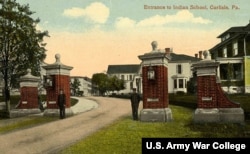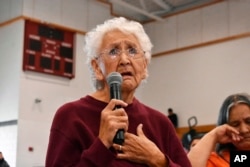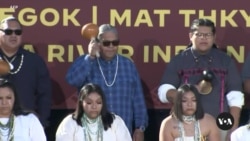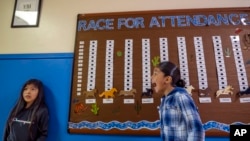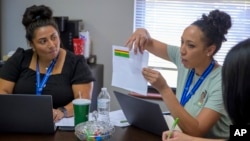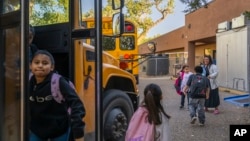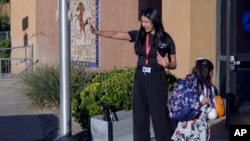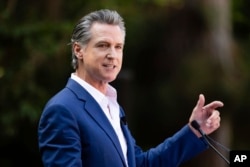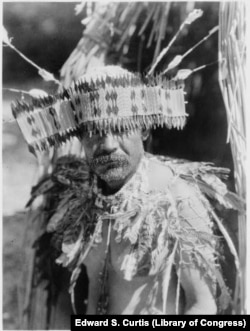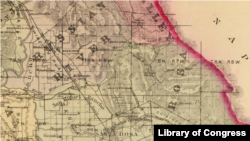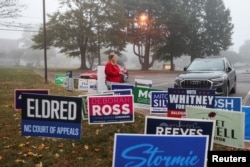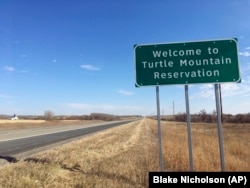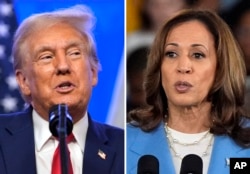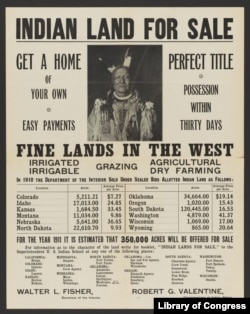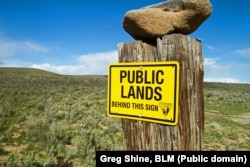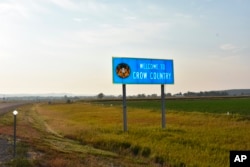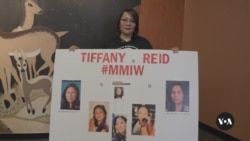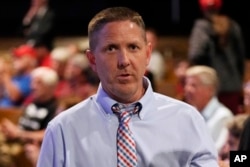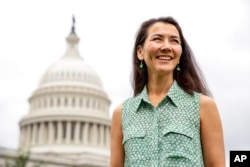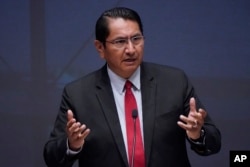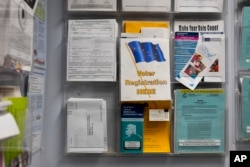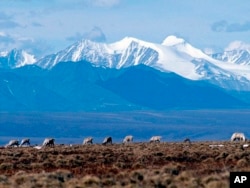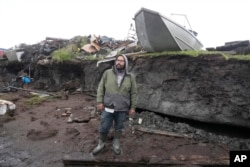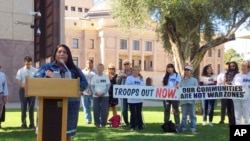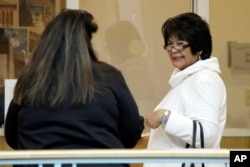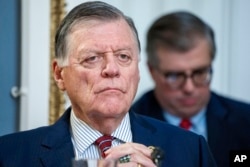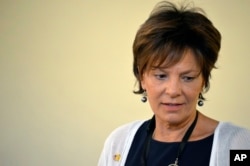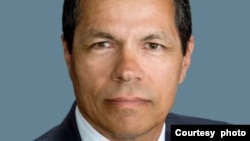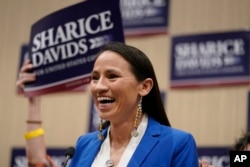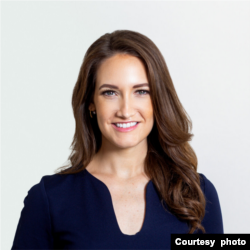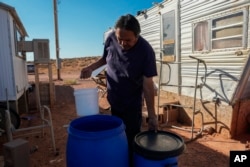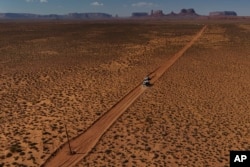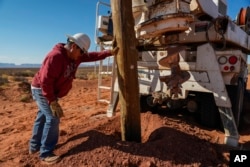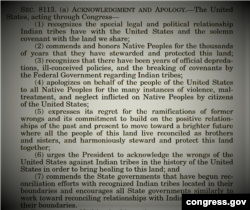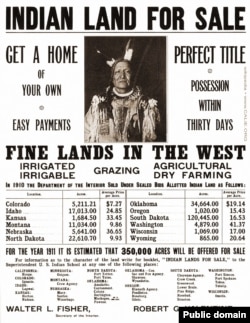Native Americans
Biden designates national monument at site of Carlisle Indian school
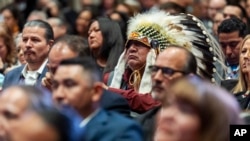
President Joe Biden has created a new national monument on the grounds of a former Indian boarding school in Pennsylvania, which served as the blueprint for hundreds of similar institutions across the United States.
“I want everyone to know,” Biden said. “I don't want people forgetting, 10, 20, 30, 50 years from now.”
Indian children from 140 tribes were taken from their families, tribes and homelands and forced to spend years at the school in the borough of Carlisle, he noted.
“It was wrong, and by making the Carlisle Indian School a national monument, we make clear that [that's] what great nations do. We don't erase history. We acknowledge it. We learn from and we remember, so we never repeat it again.”
Biden told the 2024 Tribal Nations Summit in Washington Monday that the monument will encompass 10 hectares (24.5 acres) inside what is today the Carlisle Army Barracks, including historic buildings and structures that once made up the school’s campus. These will include the brick and marble gateposts at the school’s entrance, which Carlisle students built by hand in 1910.
The U.S. Army will maintain operational control over the site, which is now home to the U.S. Army War College. The Army will collaborate with the National Park Service to oversee the planning and management of the new national monument, consulting with federally recognized tribes to ensure that the monument accurately reflects historic and contemporary impacts of the boarding school system on tribal members and communities.
“This addition to the national park system that recognizes the troubled history of U.S. and Tribal relations is among the giant steps taken in recent years to honor Tribal sovereignty and recognize the ongoing needs of Native communities, repair past damage and make progress toward healing,” said National Park Service Director Chuck Sams, a citizen of the Confederated Tribes of the Umatilla Indian Reservation in Northeast Oregon.
The announcement comes just six weeks after Biden’s visit to the Gila River Indian Community in Arizona. There, he gave a long-awaited apology to Native Americans for the boarding school era, calling it “one the most consequential things I've ever had an opportunity to do in my whole career as president of the United States.”
Earlier Monday, Interior Secretary Deb Haaland opened the summit with a speech focusing on the Federal Indian Boarding School Initiative she launched in May 2021.
The initiative resulted in a two-volume report that documented the history of the school system, accounting for 417 known schools and confirming more than 900 child deaths.
The initiative also included The Road to Healing, in which Haaland and Assistant Interior Secretary Bryan Newland traveled to 12 Native communities, giving survivors and their descendants an opportunity to share their boarding school experiences.
“So many of you spoke bravely and forthright[ly] … about the horrors you endured or the trauma that was passed down over generations. Those stories must continue to be told,” Haaland told the summit leaders.
As part of the initiative, the Interior Department engaged the National Native Boarding School Healing Coalition to conduct video interviews with boarding school survivors to create a permanent oral history collection.
Haaland announced that the Library of Congress and the Smithsonian’s National Museum of American History will partner to preserve their accounts for the public.
- By Anita Powell
Biden memorializes painful past of Native Americans
U.S. President Joe Biden on Monday presided over his final White House Tribal Nations Summit by reaching into the nation’s dark past and establishing a national monument to honor the suffering of thousands of Native children and their families in federal boarding schools in the 19th and 20th centuries. VOA White House correspondent Anita Powell reports from Washington.
- By Anita Powell
Biden memorializes painful past of Native people
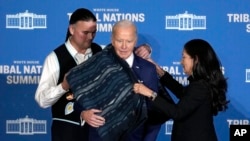
President Joe Biden on Monday presided over his final White House Tribal Nations Summit by reaching into the nation’s dark past and establishing a new national monument to honor the suffering of thousands of Native children and their families in federal boarding schools in the last century.
His proclamation starts a three-year clock to design a monument to be placed at the flagship Carlisle Indian Industrial School in Pennsylvania.
The Carlisle Indian Industrial School opened in 1879, with the stated mission to “kill the Indian” to “save the Man.” Schools like this removed children from their families and forced them to speak English, wear non-native clothing and eschew tribal customs.
Earlier this year, Biden described the treatment of thousands of Native children at government boarding schools as “a blot” on the nation’s history.
"The federal government mandated — mandated — removal of children from their families and tribes, launching what's called the federal Indian boarding school era, over a 150-year span, 150 years from the early 1800s to 1970 — one of the most horrific chapters in American history,” he said earlier this year. “We should be ashamed.”
The most recent U.S. Census found that the population of those who consider themselves wholly or partly Native is upward of nearly 9 million. The U.S. Department of the Interior says it serves 1.9 million American Indian and Alaska Natives, many in sovereign lands.
That’s a shadow of the population that historians say thrived on the continent before European colonization. Native Americans were only granted universal U.S. citizenship in 1924 with the passage of the Indian Citizenship Act.
Activists like Elveda Martinez of the Walker River Paiute Tribe say it’s remarkable how recent this history of dispossession and discrimination is.
"It's within our generation that Natives finally all had the right to vote,” she said. “So, that's still a big thing now. We always tell people, you know, it was our parents and people in that generation that fought for the right to vote."
As a group, Native residents have the highest poverty rate in the country, and their youth lag behind other demographics in education, according to a study by a bipartisan research group.
On Monday, Biden detailed his administration’s efforts to improve the livelihoods of descendants of the nation’s pre-colonial populations and to give communities more say, such as designating conservation areas. But he stressed that honoring the past is the way forward.“By making the Carlisle Indian School a national monument, we make clear what great nations do,” he said. “We don’t erase history. We acknowledge it and learn from it, so we never repeat it again.”
Interior Secretary Deb Haaland, the first Native American to serve as a Cabinet secretary, praised Biden’s work.
“President Biden has been the best president for Indian Country in my lifetime,” she said. “This is a president and an administration that truly sees Indigenous people and has worked tirelessly to address the issues in Indian Country that have long been underfunded or outright ignored.”
As a sign of her esteem, Haaland, who is a member of the Pueblo of Laguna, draped Biden in a personalized parting gift: a black-and-white version of a blanket designed by Pueblo artist Pat Pruitt, who says the motif, which depicts thunder and lightning in the desert, is meant to evoke “the feeling of that calm before the storm that is filled with electricity and sound.”
But as one tribe made clear Monday, America’s Native people are not a monolith.
The Cow Creek Band of Umpqua Tribe of Indians lashed out at the Biden administration for what the group says is a “lack of tribal consultation” over a wave of proposed off-reservation casinos, including a recent approval for Oregon’s first off-reservation casino.
“It is performative to celebrate an administration’s contributions to Indian Country when the actions tell a very different story,” Cow Creek Umpqua Tribal Chairman Carla Keene said in a statement sent to VOA on Monday. “We have been dismissed and ignored about policy that will devastate our social, cultural, and economic livelihood. There is time to do the right thing and put a stop to the pending decisions that will irreversibly harm Tribes across the Pacific Northwest and West Coast, which is a backwards step in American history, not forward.”
The principal chief of the large and powerful Cherokee nation — which includes about 450,000 people — issued a careful, diplomatic statement Monday advocating for the summit to continue under the next administration.
“I’m looking forward to attending the White House Tribal Nation’s summit this week,” Chief Chuck Hoskin Jr. posted on Facebook. “Other than when the summit was not held (2017-2020), I’ve been attending since 2013. I hope it is a productive engagement and I hope it continues on in future years.”
President-elect Donald Trump indicated that he views Native issues as intertwined with energy generation, by naming North Dakota Governor Doug Burgum as Interior secretary, while also serving as “White House energy czar.”
"We're going to do things with energy and with land interior that is going to be incredible,” he said, but did not elaborate.
As president, Trump angered Indigenous activists by lifting a ban on the Keystone XL pipeline that cuts through sovereign native lands on its path south from Canada to Texas.
Biden revoked Trump’s permit for the oil pipeline on the first day of his term.
Native American students found to miss school at higher rates
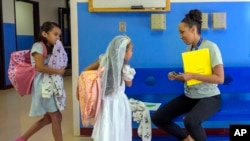
After missing 40 days of school last year, Tommy Betom, 10, is on track this year for much better attendance. The importance of showing up has been stressed repeatedly at school — and at home.
When he went to school last year, he often came home saying the teacher was picking on him and other kids were making fun of his clothes. But Tommy's grandmother Ethel Marie Betom, who became one of his caregivers after his parents split, said she told him to choose his friends carefully and to behave in class.
He needs to go to school for the sake of his future, she told him.
"I didn't have everything," said Betom, an enrolled member of the San Carlos Apache tribe. Tommy attends school on the tribe's reservation in southeastern Arizona. "You have everything. You have running water in the house, bathrooms and a running car."
A teacher and a truancy officer also reached out to Tommy's family to address his attendance. He was one of many. Across the San Carlos Unified School District, 76% of students were chronically absent during the 2022-2023 school year, meaning they missed 10% or more of the school year.
Years after COVID-19 disrupted American schools, nearly every state is still struggling with attendance. But attendance has been worse for Native American students — a disparity that existed before the pandemic and has since grown, according to data collected by The Associated Press.
Out of 34 states with data available for the 2022-2023 school year, half had absenteeism rates for Native American and Alaska Native students that were at least 9 percentage points higher than the state average.
Many schools serving Native students have been working to strengthen connections with families, who often struggle with higher rates of illness and poverty. Schools also must navigate distrust dating back to the U.S. government's campaign to break up Native American culture, language and identity by forcing children into abusive boarding schools.
History "may cause them to not see the investment in a public school education as a good use of their time," said Dallas Pettigrew, director of Oklahoma University's Center for Tribal Social Work and a member of the Cherokee Nation.
On-site health, trauma care
The San Carlos school system recently introduced care centers that partner with hospitals, dentists and food banks to provide services to students at multiple schools. The work is guided by cultural success coaches — school employees who help families address challenges that keep students from coming to school.
Nearly 100% of students in the district are Native and more than half of families have incomes below the federal poverty level. Many students come from homes that deal with alcoholism and drug abuse, Superintendent Deborah Dennison said.
Students miss school for reasons ranging from anxiety to unstable living conditions, said Jason Jones, a cultural success coach at San Carlos High School and an enrolled member of the San Carlos Apache tribe. Acknowledging their fears, grief and trauma helps him connect with students, he said.
"You feel better, you do better," Jones said. "That's our job here in the care center is to help the students feel better."
In the 2023-2024 school year, the chronic absenteeism rate in the district fell from 76% to 59% — an improvement Dennison attributes partly to efforts to address their communities' needs.
"All these connections with the community and the tribe are what's making a difference for us and making the school a system that fits them rather than something that has been forced upon them, like it has been for over a century of education in Indian Country," said Dennison, a member of the Navajo Nation.
In three states — Alaska, Nebraska and South Dakota — the majority of Native American and Alaska Native students were chronically absent. In some states, it has continued to worsen, even while improving slightly for other students, as in Arizona, where chronic absenteeism for Native students rose from 22% in 2018-2019 to 45% in 2022-2023.
AP's analysis does not include data on schools managed by the U.S. Bureau of Indian Education, which are not run by traditional districts. Less than 10% of Native American students attend BIE schools.
Schools close on days of Native ceremonial gatherings
At Algodones Elementary School, which serves a handful of Native American pueblos along New Mexico's Upper Rio Grande, about two-thirds of students are chronically absent.
The communities were hit hard by COVID-19, with devastating impacts on elders. Since schools reopened, students have been slow to return. Excused absences for sick days are still piling up — in some cases, Principal Rosangela Montoya suspects, students are stressed about falling behind academically.
Staff and tribal liaisons have been analyzing every absence and emphasizing connections with parents. By 10 a.m., telephone calls go out to the homes of absent students. Next steps include in-person meetings with those students' parents.
"There's illness. There's trauma," Montoya said. "A lot of our grandparents are the ones raising the children so that the parents can be working."
About 95% of Algodones' students are Native American, and the school strives to affirm their identity. It doesn't open on four days set aside for Native American ceremonial gatherings, and students are excused for absences on other cultural days as designated by the nearby pueblos.
For Jennifer Tenorio, it makes a difference that the school offers classes in the family's native language of Keres. She speaks Keres at home but says that's not always enough to instill fluency.
Tenorio said her two oldest children, now in their 20s, were discouraged from speaking Keres when enrolled in the federal Head Start educational program — a system that now promotes native language preservation — and they struggled academically.
"It was sad to see with my own eyes," said Tenorio, a single parent and administrative assistant who has used the school's food bank. "In Algodones, I saw a big difference to where the teachers were really there for the students, and for all the kids, to help them learn."
Over a lunch of strawberry milk and enchiladas on a recent school day, her 8-year-old son Cameron Tenorio said he likes math and wants to be a policeman.
"He's inspired," Tenorio said. "He tells me every day what he learns."
Home visits
In Arizona, Rice Intermediate School Principal Nicholas Ferro said better communication with families, including Tommy Betom's, has helped improve attendance. Since many parents are without working phones, he said, that often means home visits.
Lillian Curtis said she has been impressed by Rice Intermediate's student activities on family night. Her granddaughter, Brylee Lupe, 10, missed 10 days of school by mid-October last year but had missed just two days by the same time this year.
"The kids always want to go — they are anxious to go to school now. And Brylee is much more excited," said Curtis, who takes care of her grandchildren.
Curtis said she tells Brylee that skipping school is not an option.
The district has made gains because it is changing the perception of school and what it can offer, said Dennison, the superintendent. Its efforts have helped not just with attendance but also morale, especially at the high school, she said.
"Education was a weapon for the U.S. government back in the past," she said. "We work to decolonize our school system."
This story is part of a collaboration on chronic absenteeism among Native American students between The Associated Press and ICT, a news outlet that covers Indigenous issues.
Long-sought court ruling restores Oregon tribe's hunting, fishing rights
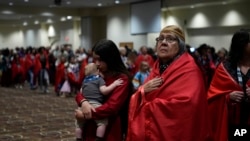
Drumming made the floor vibrate and singing filled the conference room of the Chinook Winds Casino Resort in Lincoln City, on the Oregon coast, as hundreds in tribal regalia danced in a circle.
For the last 47 years, the Confederated Tribes of Siletz Indians have held an annual powwow to celebrate regaining federal recognition. This month’s event, however, was especially significant: It came just two weeks after a federal court lifted restrictions on the tribe's rights to hunt, fish and gather — restrictions tribal leaders had opposed for decades.
“We're back to the way we were before,” Siletz Chairman Delores Pigsley said. “It feels really good.”
The Siletz is a confederation of over two dozen bands and tribes whose traditional homelands spanned western Oregon, as well as parts of northern California and southwestern Washington state. The federal government in the 1850s forced them onto a reservation on the Oregon coast, where they were confederated together as a single, federally recognized tribe despite their different backgrounds and languages.
In the 1950s and ‘60s, Congress revoked recognition of over 100 tribes, including the Siletz, under a policy known as “termination.” Affected tribes lost millions of acres of land as well as federal funding and services.
“The goal was to try and assimilate Native people, get them moved into cities,” said Matthew Campbell, deputy director of the Native American Rights Fund. “But also I think there was certainly a financial aspect to it. I think the United States was trying to see how it could limit its costs in terms of providing for tribal nations.”
Losing their lands and self-governance was painful, and the tribes fought for decades to regain federal recognition. In 1977, the Siletz became the second tribe to succeed, following the restoration of the Menominee Tribe in Wisconsin in 1973.
But to get a fraction of its land back — roughly 1,457 hectares of the 445,000-hectare reservation established for the tribe in 1855 — the Siletz tribe had to agree to a federal court order that restricted their hunting, fishing and gathering rights. It was only one of two tribes in the country, along with Oregon’s Confederated Tribes of Grand Ronde, compelled to do so to regain tribal land.
The settlement limited where tribal members could fish, hunt and gather for ceremonial and subsistence purposes, and it imposed caps on how many salmon, elk and deer could be harvested in a year. It was devastating, tribal chair Pigsley recalled: The tribe was forced to buy salmon for ceremonies because it couldn’t provide for itself, and people were arrested for hunting and fishing violations.
“Giving up those rights was a terrible thing,” Pigsley, who has led the tribe for 36 years, told The Associated Press earlier this year. “It was unfair at the time, and we’ve lived with it all these years.”
Decades later, Oregon and the U.S. came to recognize that the agreement subjecting the tribe to state hunting and fishing rules was biased, and they agreed to join the tribe in recommending to the court that the restrictions be lifted.
“The Governor of Oregon and Oregon’s congressional representatives have since acknowledged that the 1980 Agreement and Consent Decree were a product of their times and represented a biased and distorted position on tribal sovereignty, tribal traditions, and the Siletz Tribe’s ability and authority to manage and sustain wildlife populations it traditionally used for tribal ceremonial and subsistence purposes,” attorneys for the U.S., state and tribe wrote in a joint court filing.
Late last month, the tribe finally succeeded in having the court order vacated by a federal judge. And a separate agreement with the Oregon Department of Fish and Wildlife has given the tribe a greater role in regulating tribal hunting and fishing.
As Pigsley reflected on those who passed away before seeing the tribe regain its rights, she expressed hope about the next generation carrying on essential traditions.
“There’s a lot of youth out there that are learning tribal ways and culture,” she said. “It’s important today because we are trying to raise healthy families, meaning we need to get back to our natural foods.”
Among those celebrating and praying at the powwow was Tiffany Stuart, donning a basket cap her ancestors were known for weaving, and her 3-year-old daughter Kwestaani Chuski, whose name means “six butterflies” in the regional Athabaskan language from southwestern Oregon and northwestern California.
Given the restoration of rights, Stuart said, it was “very powerful for my kids to dance.”
“You dance for the people that can’t dance anymore,” she said.
Proposed tribal casino sparks tensions in California

The Koi Nation, a small Native American tribe with fewer than 100 members, is moving closer to building a $600 million Las Vegas-style casino resort in California’s Sonoma County, just an hour north of San Francisco.
The Bureau of Indian Affairs has released its final environmental impact statement for the proposed Shiloh Resort and Casino, marking a key step in the tribe's application to place 27 hectares of land into federal trust.
The environmental report analyzed the project's potential impacts on air and water quality, wildlife, traffic, and other factors. While most effects were deemed "less than significant," some were classified as "potentially significant." The public now has 30 days to review the findings and submit comments before the bureau makes a final decision.
The Shiloh project faces stiff opposition from California lawmakers, Governor Gavin Newsom and neighboring tribes. Newsom argued in an August letter to the Department of the Interior that the land in question lies outside the Koi Nation’s historical homeland — a key requirement under federal law for gaming approval.
Competing tribes, most notably the Federated Indians of Graton Rancheria, also oppose the project. They launched a high-profile media campaign earlier this month with full-page ads in major newspapers accusing the Interior Department of undermining tribal sovereignty.
At the heart of the controversy is the Indian Gaming Regulatory Act of 1988, which sets the rules for tribal gaming and includes guidelines about a tribe’s historical connection to land. The casino must be located on land the federal government holds in trust for the tribe. The act also prohibited gaming on lands acquired after October 17, 1988, unless certain conditions are met.
One such exception applies to tribes with restored federal recognition. In December 2023, the Biden administration announced an updated final rule that made it easier for tribes to acquire land in trust. The rule now permits gaming on lands placed into trust as part of restoring territory to a landless tribe that has regained federal recognition.
To qualify for this exception, a tribe must demonstrate both a historical and contemporary connection to the land.
For the Koi Nation, the fight is deeply personal. In 1916, the federal government recognized the tribe under its former name, the Lower Lake Rancheria, and allocated 56 hectares of land in neighboring Lake County which were largely unfarmable. By 1918, most tribal members had relocated to Sonoma County.
In 1956, the federal government sold off 40 hectares of the Lake County land and transferred the remaining 16 hectares to the sole tribal member still residing there.
The Interior Department did not officially terminate the tribe; through clerical errors, it simply forgot about them. Decades later, the government reaffirmed that relationship.
“The Lower Lake Rancheria have been officially overlooked for many years by the Bureau of Indian Affairs even though their government-to-government relationship with the United States was never terminated,” then-assistant Indian affairs secretary Kevin Gover stated in his December 29, 2000 finding. “I am pleased to correct this egregious oversight.”
The Koi purchased the Shiloh land for $12.3 million in 2021 and applied to the government to place the land into trust. The tribe says that trails their ancestors used in trade pass directly through the site.
“The Koi Nation has been in this region for thousands of years and is fully within its rights to pursue this project,” said Sam Singer, a spokesperson for the tribe.
Singer attributes much of the opposition to fear of competition. Currently, more than 60 tribes operate 66 casinos across California. The Graton Rancheria operates a resort and casino about 17 kilometers south of the Shiloh property and is currently undergoing a $1 billion expansion.
Native groups: Exit polls on Native voter preferences were flawed
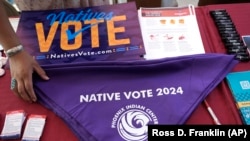
In the days following the November 5 election, media outlets widely cited NBC exit polls indicating that 65% of Native American voters cast their ballots for Donald Trump.
While Native American advocacy groups acknowledge a trend of Native voters shifting toward the political right, they argued that the polling in this case was flawed and did not accurately represent their demographic.
NBC did not conduct the polling itself. It is one of four major news networks in the National Election Pool, or NEP, which relies on marketing research company Edison Research to question voters as they leave the polls.
Edison conducted phone, email and text message surveys of absentee and early voters in Georgia, North Carolina, Nevada and Ohio before Election Day and polled exiting voters at more than 300 polling stations across the U.S.
Once polling stations shut down on election night, Edison forwarded the voting data to NEP members so that they could analyze answers and project the winners.
NBC was the first to report exit polling data that included Native Americans. ABC News lumped Native Americans into the "all other races" category, as did CBS News and CNN.
The 65% figure prompted skepticism and confusion among some Native American observers. Native News Online, working with Northwestern University's Medill School of Journalism and national survey firm Qualtrics, surveyed 865 Native voters and found that 51% of Native voters voted for Donald Trump.
In contrast, 60% of the nearly 5,000 Native Americans who participated in Illuminative's Indigenous Futures Survey in 2020 identified as liberal, and 51% said they were Democrats.
A closer look at the numbers
Stephanie Fryberg (Tulalip), who leads Northwestern University's Research for Indigenous Social Action and Equity collaborative, was puzzled by the NBC calculation.
In a November 8 editorial in Native News Online, she said that the Native voter sample size was too small and couldn't accurately reflect Native voter preferences nationwide. She pointed out that 80% of respondents were from urban and suburban areas, while less than 20% came from rural areas.
In a separate editorial on November 18, Native News Online editor Levi Rickert questioned whether the respondents were legitimate members of federally recognized tribes.
“Perhaps the most challenging aspect of research and data collection among Native Americans is self-identification,” he wrote. “For various reasons, many people claim Native American ancestry. Among Native Americans, a common joke is that the largest 'tribe' in Indian Country is the 'Wannabe' tribe.”
VOA reached out to Fryberg to ask how she arrived at the numbers.
"We wanted to better understand the sample of Native voters that major news organizations were using to draw broad conclusions about voting patterns in the 2024 election," she answered by email. "Reports from the NEP show that only about 1% of these respondents identified as Native American, equating to roughly 229 individuals … underscoring the urgent need for more comprehensive and inclusive sampling strategies that genuinely reflect Native voices in electoral data."
Edison Research Executive Vice President Rob Farbman agreed that the sample size was small, but he told VOA that it met the NEP's minimum criteria for reporting subgroups.
"This is a national survey meant to represent the country, but subgroups as small as Native Americans … are difficult to measure," he said. "It's certainly possible that our survey is underrepresenting people that live on reservations."
He also noted that results at the county level are still coming in.
"And the votes that we've been seeing so far are showing that Trump is doing way better among American Indians than last time,” Farbman said.
Allison Neswood, a staff attorney at the Native American Rights Fund, said that exit polls should be viewed "with a lot of skepticism," and that the Edison poll "should really be discarded."
"Real hard conclusions will take a little bit more time," she said. "We're going to have to get more granular data, below the county level, to the precinct level."
Land Back movement gains ground, but full tribal control still out of reach
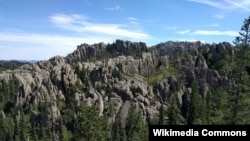
Land Back is a global, Indigenous-led movement advocating for the return of stolen lands.
While Indigenous communities have long engaged in that fight, “Land Back” as a meme began to gain popularity in 2019.
It now describes a decentralized international movement that emphasizes treaty rights, tribal sovereignty, climate justice and cultural revival.
“Land Back is like a prism with many facets to it,” said Alvin Warren, a former lieutenant governor of the Santa Clara Pueblo in New Mexico who has spent decades advocating for the restoration and protection of Indigenous lands.
“For me, within the paradigm of the United States legal system and land tenure system, it absolutely means the restoration of full title to Indigenous people of a particular piece of land that is part of their original homeland.”
And it doesn’t stop with the transfer of legal title.
“It’s about reviving the land-based aspects of our ways of life,” he said. “It could be agriculture, it could be subsistence hunting, it could be gathering things. It is about reuniting, reconnecting us with our homeland, about undoing the many layers of separation and disconnection from our homelands that has been the goal of colonization in this country and in other parts of the world.”
Nick Tilsen, an Oglala Lakota from the Pine Ridge Reservation in South Dakota, gained national attention in July 2020 for blockading the road to Mount Rushmore ahead of a visit by then-President Donald Trump.
Shortly afterward, the NDN Collective activist launched a #LandBack campaign for “the reclamation of everything stolen from the original peoples.”
“When they [the federal government] took the land, they took everything from our people,” Tilsen said. “They took our governance structures. They took our culture. They took our language. They tried to destroy the familial structure of our people, our ability to make decisions over our food systems and our education systems.”
Tilsen believes the U.S. government should return all public lands, including the Black Hills, which the 1868 Fort Laramie Treaty designated for the “absolute and undisturbed use and occupation” of Sioux Bands, today known as the Oceti Sakowin (Seven Council Fires).
That treaty was nullified without the tribe’s consent in the Indian Appropriations Bill of 1876 after a government and scientific expedition confirmed the presence of gold in the hills.
Is getting that land back a realistic goal?
James Swan, a member of the Cheyenne River Sioux tribe in South Dakota, doesn’t think so.
“It’s a pipe dream,” the founder of the grassroots Indigenous rights group United Urban Warrior Society, said. “But let’s say the U.S. government does return the Black Hills. Then what?”
Swan points out that tribes are not truly independent.
“They're part of the U.S. government,” he said. “A tribal chairman might be elected by the tribe, but he can't do anything without the tribal superintendent’s permission, and the superintendent works for the Bureau of Indian Affairs.”
Fragmented land ownership
In 1887, the government allotted some treaty lands to Native American heads of household. The remaining land, over 36 million hectares, was sold to settlers or granted to newly formed states to generate funds to support public institutions such as schools, jails or hospitals. States were allowed to sell off some of their trust land “for no less than ten dollars an acre.”
Grist and High Country News recently reported that states today hold more than 809,000 hectares of surface and subsurface land on Indian reservations.
Federal oversight
The U.S. government legally owns 21 million hectares of reservation land that it holds in trust for the benefit of tribes and their members.
Federal rules limit what tribes can do with that trust land — they can’t sell, lease or transfer it without Interior Department approval and must follow strict environmental rules for many projects.
Within that trust land are restricted-fee lands that are owned by individual Native Americans or tribes but cannot be sold or transferred without federal approval and are exempt from state or local land-use regulations.
There are also fee-simple lands within those reservations that are owned outright by individuals or tribes.
“The fee-simple owner is the absolute total owner,” said Robert Miller, a law professor at Arizona State University and an expert in federal Indian law. “You have all the rights of ownership. Leave it to whoever you want. Sell it to whoever you want for a dollar or a million dollars.”
Previously, tribes were advised to purchase reservation land under a fee-simple title.
“But the Supreme Court ruled in 1992 and 1998 that if a tribe holds land under [a] fee-simple title, the state can impose annual taxes on it,” Miller said. “This has led tribes to request that the Interior Department take their fee-simple land into trust to avoid state interference.”
Pathways to land back
In December 2012, the Interior Department launched the Land Buy-Back Program, which purchased and restored to tribal trust more than 1.2 million hectares of land in 15 states over 10 years.
“The Land Buy-Back Program’s progress puts the power back in the hands of tribal communities to determine how their lands are used — from conservation to economic development projects,” Interior Secretary Deb Haaland said ahead of the 2023 White House Tribal Nations Summit in Washington.
But some Native Americans are skeptical about the program.
“It is not about returning lost lands and putting them into trust for Tribes,” Todd Hall (Hidatsa) wrote in Buffalo’s Fire, an independent news platform run by the Indigenous Media Freedom Alliance. “It is about dispossessing Individual Indians of their landownership rights and converting those rights to the collective ownership of the Tribal governments which were enacted by the Indian Reorganization Act of 1934.”
Today, tribes across the U.S. continue to buy fractional interests in trust or restricted land from willing sellers, often with help from conservancy groups and private landowners.
In September, the Western Rivers Conservancy transferred a 188-hectare former private cattle ranch to the Graton Rancheria in California for “permanent conservation and stewardship.”
Individuals also make private donations of land. In October 2018, Iowa citizen Rich Snyder voluntarily signed over land he owned in southern Colorado to the Ute Tribe.
In June, California announced it would return 1,133 hectares of ancestral land to the Shasta Indian Nation. Montana is currently considering the return of 11,800 hectares of trust land to the Confederated Salish and Kootenai Tribes on the Flathead Reservation in exchange for federal public lands outside of the reservation.
A University of Montana study in 2023 identified 44 laws placing federal public lands into tribal trust. Many, however, upheld existing rights such as access, grazing, mining or water use. Others stipulate that the land remain “forever wild” or be used only for “traditional purposes” such as hunting or holding ceremonies.
There are also legal routes to getting land back, especially with the U.S. Supreme Court establishing a key precedent in the landmark McGirt v. Oklahoma case, which reaffirmed that a large area of eastern Oklahoma still belongs to the Muscogee (Creek) Nation.
“I predict there will be 30 to 50 years of litigation over every little issue if the state, feds and tribes don't cooperate,” Miller said.
Wisconsin agency issues permits for Enbridge Line 5 reroute around reservation

Enbridge's contentious plan to reroute an aging pipeline around a northern Wisconsin tribal reservation moved closer to reality Thursday after the company won its first permits from state regulators.
Wisconsin Department of Natural Resources officials announced they have issued construction permits for the Line 5 reroute around the Bad River Band of Lake Superior Chippewa's reservation. The energy company still needs discharge permits from the DNR and the U.S. Army Corps of Engineers.
The project has generated fierce opposition. The tribe wants the pipeline off its land, but tribal members and environmentalists maintain rerouting construction will damage the region's watershed and perpetuate the use of fossil fuels.
Permits issued with conditions
The DNR issued the construction permits with more than 200 conditions attached. The company must complete the project by November 14, 2027, hire DNR-approved environmental monitors and allow DNR employees to access the site during reasonable hours.
The company also must notify the agency within 24 hours of any permit violations or hazardous material spills affecting wetlands or waterways; can't discharge any drilling mud into wetlands, waterways or sensitive areas; keep spill response equipment at workspace entry and exit points; and monitor for the introduction and spread in invasive plant species.
Enbridge officials issued a statement praising the approval, calling it a "major step" toward construction that will keep reliable energy flowing to Wisconsin and the Great Lakes region.
Bad River tribal officials warned in their own statement Thursday that the project calls for blasting, drilling and digging trenches that would devastate area wetlands and streams and endanger the tribe's wild rice beds. The tribe noted that investigations identified water quality violations and three aquifer breaches related to the Line 3 pipeline's construction in northern Minnesota.
"I'm angry that the DNR has signed off on a half-baked plan that spells disaster for our homeland and our way of life," Bad River Chairman Robert Blanchard said in the statement. "We will continue sounding the alarm to prevent yet another Enbridge pipeline from endangering our watershed."
Tribe sues in 2019
Line 5 transports up to 23 million gallons (about 87 million liters) of oil and natural gas daily from Superior, Wisconsin, through Michigan to Sarnia, Ontario. About 19 kilometers (12 miles) of the pipeline run across the Bad River reservation.
The tribe sued Enbridge in 2019 to force the company to remove the pipeline from the reservation, arguing that the 71-year-old line is prone to a catastrophic spill and that land easements allowing Enbridge to operate on the reservation expired in 2013.
Enbridge has proposed a 66-kilometer (41-mile) reroute around the reservation's southern border.
The company has only about two years to complete the project. U.S. District Judge William Conley last year ordered Enbridge to shut down the portion of pipeline crossing the reservation within three years and pay the tribe more than $5 million for trespassing. An Enbridge appeal is pending in a federal appellate court in Chicago.
Michigan's Democratic attorney general, Dana Nessel, filed a lawsuit in 2019 seeking to shut down twin portions of Line 5 that run beneath the Straits of Mackinac, the narrow waterways that connect Lake Michigan and Lake Huron. Nessel argued that anchor strikes could rupture the line, resulting in a devastating spill. That lawsuit is still pending in a federal appellate court.
Michigan regulators in December approved the company's $500 million plan to encase the portion of the pipeline beneath the straits in a tunnel to mitigate risk. The plan is awaiting approval from the U.S. Army Corps of Engineers.
New Mexico helps Indigenous people search for missing family members
The U.S. Department of the Interior says American Indian and Alaska Native people are at a disproportionate risk of going missing, experiencing violence or being murdered. In the Southwest state of New Mexico, some Indigenous families are using a new grant to help expand their search for justice. Gustavo Martinez Contreras has our story.
Native Americans share mixed reactions to Trump win
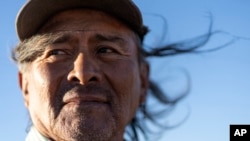
In 2020, a record-setting six Native American candidates secured seats in the U.S. House of Representatives. This year, nine Native candidates ran for Congress, including four incumbents.
Confirmed winners
Representative Josh Brecheen, a Choctaw Republican representing Oklahoma's 2nd District, retained his seat, securing 74% of the vote. He thanked his supporters afterward, promising "to continue our work to secure our borders, rein in deficit spending and put a stop to our currency devaluation driving inflation."
Republican incumbent Representative Tom Cole, Chickasaw, was reelected to serve Oklahoma's 4th District for an 11th term.
Kansas Democrat Representative Sharice Davids, a Ho-Chunk citizen, retained the House seat she won in 2018.
"We are going to keep up our fight. We are absolutely going to keep up our fight," Davids told supporters. "To do things like expand Medicaid, making sure that we have good public schools, making sure we're funding public education including special ed, making sure we have a Kansas that actually works for everyone."
Incumbent Representative Mary Peltola (Yup'ik), a Democrat, has represented the Alaska district at large since 2022. The race has not yet been called, but as of Friday evening, she was behind her Republican opponent. Alaska uses ranked-choice voting, by which voters rank candidates in order of preference. Election officials are still waiting for incoming ballots that have yet to be counted and hope to certify results by the end of November.
Results are still pending on whether former Navajo Nation President Jonathan Nez will win his bid to represent Arizona's 2nd District in the House.
"We're still waiting for some votes to come in, especially in the counties that are more highly Democratic, so it will be interesting to see how those votes look," Nez told local news outlet InMaricopa.
How Natives voted
As VOA previously reported, experts indicate that Native voters are not strictly partisan; instead, they prioritize issues that best address tribal needs. While they have traditionally leaned Democratic, recent statistics reveal a shift of the Native vote toward the right.
The exact number of Native Americans who voted on November 5 remains unknown. This year saw expanded efforts by organizers to mobilize Native voters, especially in swing states such as Arizona and New Mexico. However, barriers to voting persist for many Native communities, including limited access to polling locations and mail services on reservations, which can make casting ballots challenging.
"Indian people are microcosms of society," Aaron Payment, former chairperson of the Sault Ste. Marie Tribe of Chippewa in Michigan, commented on the Native America Calling podcast Wednesday. "A lot of Indian people live in rural areas … so people voted based on what they heard."
He cited the impact of Christian missionaries, as well as the pro-life movement and the National Rifle Association.
Supporters of President-elect Donald Trump in Indian Country include Myron Lizer, former vice president of the Navajo Nation.
"Our people have been voting Democrat for over five decades and nothing's changed," he told the Navajo Times in late October.
Cherokee citizen Senator Markwayne Mullin and Representative Cole, both of Oklahoma, also backed Trump and stand to play key roles in the new administration.
Project 2025
The conservative Heritage Foundation in 2023 released Project 2025, a mandate for a future Republican administration. It proposes some substantial changes that directly affect tribes.
"His Project 2025 plans will centralize power in the executive office, an extreme threat to Tribal-federal relations and our rights as sovereign nations to make decisions about policies that impact our lands, resources, and people," Judith LeBlanc (Caddo), director of the Native Organizers Alliance, wrote for Native News Online Thursday.
The plan proposes to reverse Biden/Harris climate change policies and prioritize coal, oil, gas and mineral mining.
"Project 2025 specifically calls for expanding the Willow Project, drilling in Alaska’s Arctic National Wildlife Refuge, mining in Minnesota’s Boundary Waters, and shrinking Bears Ears National Monument," said Gussie Lord, managing attorney for Earthjustice’s Tribal Partnerships Program.
"Historically, these kinds of activities have resulted in negative impacts to tribal resources, such as serious long-term pollution and destruction of sacred sites and cultural resources. The tribes we work with at Earthjustice are fighting to preserve natural areas so they can continue to be used," Lord said.
While unwelcome news for some tribes, the plan could be good news for others.
"There are some tribes, I think energy [producing] tribes, that are probably going to be pleased with the outcome because they didn't quite jump on board on the clean energy [agenda]," Payment noted during the Native America Calling discussion.
Trump has vowed to launch unprecedented deportation operations and continue work on the southern border wall. The Tohono O'odham tribe, whose members straddle the U.S.-Mexico border, have complained that wall construction damaged cultural sites and restricted free movement across the border.
The Heritage plan calls for restructuring or abolishing some federal departments. It would eliminate the Education Department and shift its Indian education program to the Bureau of Indian Affairs (BIA). It would also eliminate the Head Start child care programs that currently serve tens of thousands of Native American children.
Project 2025 does not explicitly mention moving the BIA to the State Department, an idea that was reportedly floated during Trump's first term.
Levi Rickert (Prairie Band Potawatomi Nation), publisher and editor of Native News Online, advises caution.
"Given the complexities of issues impacting tribal nations, more research and at least a year-long consultation should be conducted with tribal leaders and only after an agreement has been reached should such a drastic change take place," he told VOA via email. "Ideally, a separate department or federal agency called Indian Affairs should be created so that tribal nations can be afforded the due respect they deserve."
But Project 25 does propose restructuring the Interior Department (DOI); possible contenders to head DOI include Doug Burgum, governor of oil-rich North Dakota.
Looking forward
Tribal leaders are urging citizens to set aside differences and focus on the work ahead. After all, they've endured much over the centuries.
"Now is the time to come together as a Tribe and support each other and look out for one another as has been our way for generations," Jaison Elkins, chairman of the Muckleshoot tribe in Washington state, posted on the tribe's website. "There will be opportunities and obstacles in the upcoming months, as there always are, but together we can handle anything."
A guide to Native American candidates for Congress in 2024
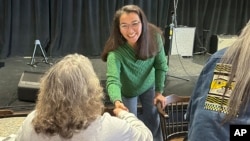
Native Americans comprise 3.4% of the U.S. population but hold only 0.07% of all elected offices. In 2020, a record-breaking six Native Americans were elected to Congress. This year, nine Native Americans, including four incumbents, are vying for seats in the U.S. House of Representatives.
REPUBLICAN CANDIDATES:
Incumbent Josh Brecheen (Choctaw), Oklahoma, 2nd District
Brecheen is a member of the House Committee on Homeland Security and the House Budget Committee. He previously served in the Oklahoma Senate, where he limited himself to an eight-year term.
In an editorial for the McCarville Report following a 2023 trip to the U.S. border with Mexico, Brecheen cited nearly 4.7 million illegal crossings since 2020 and record levels of drug and human trafficking. He argues that policy changes, including halting border wall construction and revising federal immigration laws, have weakened border security.
Brecheen would like to complete the border wall and implement advanced security technology, including ground sensors, to improve surveillance.
He prioritizes a strong military and supports gun rights. He opposes abortion and defunding the police.
On financial issues, he pushes for budget cuts to reduce inflation and the national debt, and he says he is committed to protecting Social Security and Medicare.
Sharon Clahchischilliage (Navajo), New Mexico, 3rd District
Clahchischilliage currently serves on the New Mexico Public Education Commission and is running against the incumbent Democrat, Teresa Fernandez.
The district includes most of northern New Mexico and some of the eastern part of the state. Her district holds large fossil fuel and mineral reserves, which Clahchischilliage says are vital to economic development.
“It’s time for Congress to hear a voice like mine, someone who has served our country, taught in the classroom, raised on the family farm and fought against the radicals in Santa Fe," she told the Albuquerque Journal in September. "From energy production to protecting the farmers, ranchers and herders, New Mexicans need someone who has lived their experiences, not tell them how to live.”
Clahchischilliage previously served in the state Legislature, supporting water rights and investments in infrastructure, education and economic development. During a candidate forum October 7 in Santa Fe, she said she does not believe in climate change.
“The earth is cleansing itself,” she said.
She opposes gun safety laws and believes the government should focus more on crime involving the use of guns rather than on the weapons themselves.
Incumbent Tom Cole (Chickasaw), Oklahoma, 4th District
Cole was elected to Congress in 2002 and is serving his 10th term. He is the longest-serving Native American lawmaker in House history.
In April, he became the first Native American to chair the House Appropriations Committee.
“States and the federal government must work with Native Americans to maintain the integrity of their heritage, culture, and rights,” Cole wrote in his weekly column shortly after being named. “At the same time, the federal government must uphold its constitutional oath to tribes to provide basic resources such as healthcare, education, infrastructure, and law enforcement, among many others, in Indian Country.”
He says veterans' services, Social Security reform and border security are his top priorities.
In the final days of his campaign, Cole led a bipartisan delegation to the Middle East to strengthen alliances and deepen collaboration on security challenges. In Israel, Prime Minister Benjamin Netanyahu and top officials briefed the group on current military operations and hostage rescue efforts.
Yvette Herrell (Cherokee), New Mexico, 2nd District
Herrell is challenging Democratic incumbent Gabe Vasquez in a district that includes a chunk of the southern border with Mexico.
A former U.S. representative for this district from 2021 to 2023, she favors restarting construction of the border wall and ending so-called "catch and release" policies that hold migrants in detention rather than allowing them into the community while they wait for their hearings.
Endorsed by the New Mexico Sheriffs’ Association and the Albuquerque Police Officers’ Association, she advocates "defending" rather than "defunding" police. Herrell strongly supports Second Amendment gun rights and has been endorsed by the National Rifle Association.
Herrell says she prioritizes economic growth through reduced regulation, lower energy prices and increased domestic oil and gas production, which, in part, could fund state education programs. She opposes abortion, with exceptions for rape, incest and the life of the mother.
DEMOCRATIC CANDIDATES
Dennis Baker (Muscogee of Euchee descent), Oklahoma, 1st District
Baker is an attorney and former FBI special agent whose platform focuses on worker rights. He supports raising the federal minimum wage, protecting and expanding labor unions and strengthening worker protections.
Baker says he was moved to run for political office after watching the attack on the U.S. Capitol on January 6, 2021.
“I saw the results of political extremism and said, you know, that's not my values. I don't think it's America's values,” he told Tulsa’s FOX23 News in July.
Baker opposes any state-level challenges to tribal authority. In 2022, the U.S. Supreme Court ruled in Oklahoma v. Castro-Huerta that state governments have the authority to prosecute certain cases on tribal lands. Baker opposes any state-level challenges to the authority of 39 recognized tribes in Oklahoma.
Baker also supports reproductive rights and marriage equality.
Incumbent Sharice Davids (Ho-Chunk), Kansas, 3rd District
Davids was elected to represent Kansas' 3rd District in 2018, one of the first two Native American women to serve in Congress — the other was Deb Haaland (Pueblo of Laguna), representing New Mexico’s 1st District and currently U.S. secretary of the interior.
Davids has a background as a lawyer and former mixed martial arts fighter. Her career in Washington has focused on reducing living costs for families, promoting economic growth and advocating for government accountability.
She worked with Republican Representative Tom Cole of Oklahoma to reauthorize the Violence Against Women Act, which addressed domestic violence, sexual assault, dating violence and stalking She and Cole also introduced the Truth and Healing Commission on Indian Boarding School Policies Act of 2024, a bill that, if passed, would create a commission to investigate the federal Indian boarding school system and recommend actions to promote the healing of survivors and descendants.
In her district, Davids secured more than $1.5 billion in federal funds through the Bipartisan Infrastructure Law to improve the state’s infrastructure.
Incumbent Mary Peltola (Yup’ik), Alaska, District at Large
Peltola grew up in towns along the Kuskokwim River in western Alaska. She began her political career early. In 1998, at age 24, she won a seat in the state House of Representatives, the first Alaska Native to serve in that position. In 2022, she won Alaska’s only seat in the U.S. House, and just days after being sworn in, she introduced a bill establishing an office of food security within the Department of Veterans Affairs, which passed in the House with strong bipartisan support.
A strong advocate for Alaska Natives, her top concerns are subsistence fishing, food security, infrastructure and the impact of climate change.
She also worries about out-migration from her state.
"We are seeing this negative trend of our young people leaving and people not moving to Alaska," Peltola told Alaska Public Media on October 30. "I think that we really need to be talking more and finding more solutions on food security, on shipping costs, on energy costs."
Madison Horn (Cherokee), Oklahoma, 5th District
Horn is running for a seat in Congress for the second time. In 2022, she lost her bid for a U.S. Senate seat. This year, she is looking to unseat House Republican incumbent Stephanie Bice.
Her background is in cybersecurity and national security. She was a founding member of Siemens Energy’s global cyber practice and later CEO of Critical Fault, an Oklahoma-based cybersecurity firm whose logo is “paranoid with a purpose.”
In a recent post on X, Horn noted that China, Russia and Iran are advancing their cyber capabilities and building alliances to threaten U.S. security. Her key concerns include a digital Cold War with China over economic security and the risks of quantum computing to current encryption systems.
“We need technical expertise and with a strategic vision to craft modern policies that enhance American resilience against evolving threats,” she said.
Jonathan Nez (Navajo), Arizona, 2nd District
Nez began his political career as the vice president of the Shonto Chapter, one of the 110 local, semi-self-autonomous districts on the Navajo Nation, the largest Indian reservation in the U.S. Later, he served on the Navajo Nation council, and in 2015 was elected the Nation’s vice president and served until 2023.
He steered Navajos through the COVID-19 pandemic and organized a vaccination campaign through which 70% of Navajo citizens were vaccinated.
Nez says his policy priorities include protecting voting rights, advancing border security and immigration reform, ensuring water security and environmental sustainability in the face of climate change, and upholding reproductive rights and marriage equality as matters of individual autonomy.
US forest managers finalize land exchange with Native American tribe in Arizona
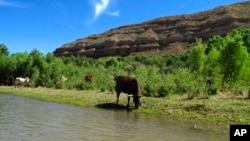
U.S. forest managers have finalized a land exchange with the Yavapai-Apache Nation that has been decades in the making and will significantly expand the size of the tribe's reservation in Arizona's Verde Valley, tribal leaders announced Tuesday.
As part of the arrangement, six parcels of private land acquired over the years by the tribe will be traded to the U.S. Forest Service in exchange for the tribe gaining ownership of 12.95 square kilometers of national forest land that is part of the tribe’s ancestral homelands. The tribe will host a signing ceremony next week to celebrate the exchange, which was first proposed in 1996.
“This is a critical step in our history and vital to the nation’s cultural and economic recovery and future prosperity,” Yavapai-Apache Chairwoman Tanya Lewis said in a post on the tribe's website.
Prescott National Forest Supervisor Sarah Clawson said in a statement that there had been many delays and changes to the proposal over the years, but the tribe and the Forest Service never lost sight of developing an agreement that would benefit both public and tribal lands.
The federal government has made strides over recent years to protect more lands held sacred by Native American tribes, to develop more arrangements for incorporating Indigenous knowledge into management of public lands and to streamline regulations for putting land into trust for tribes.
The Yavapai-Apache Nation is made up of two distinct groups of people — the Wipuhk’a’bah and the Dil’zhe’e. Their homelands spanned more than 41,440 square kilometers of what is now central Arizona. After the discovery of gold in the 1860s near Prescott, the federal government carved out only a fraction to establish a reservation. The inhabitants eventually were forced from the land, and it wasn't until the early 1900s that they were able to resettle a tiny portion of the area.
In the Verde Valley, the Yavapai-Apache Nation's reservation lands are currently comprised of less than 7.77 square kilometers near Camp Verde. The small land base hasn't been enough to develop economic opportunities or to meet housing needs, Lewis said, pointing to dozens of families who are on a waiting list for new homes.
Lewis said that in acknowledgment of the past removal of the Yavapai-Apache people from their homelands, the preamble to the tribal constitution recognizes that land acquisition is among the Yavapai-Apache Nation's responsibilities.
Aside from growing the reservation, the exchange will bolster efforts by federal land managers to protect the headwaters of the Verde River and ensure the historic Yavapai Ranch is not sold for development. The agreement also will improve recreational access to portions of four national forests in Arizona.
On Navajo Nation, push to electrify more homes on vast reservation
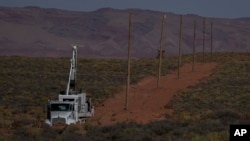
After a five-year wait, Lorraine Black and Ricky Gillis heard the rumblings of an electrical crew reach their home on the sprawling Navajo Nation.
In five days' time, their home would be connected to the power grid, replacing their reliance on a few solar panels and propane lanterns. No longer would the CPAP machine Gillis uses for sleep apnea or his home heart monitor transmitting information to doctors 400 miles away face interruptions due to intermittent power. It also means Black and Gillis can now use more than a few appliances — such as a fridge, a TV, and an evaporative cooling unit — at the same time.
"We're one of the luckiest people who get to get electric," Gillis said.
Many Navajo families still live without running water and electricity, a product of historic neglect and the struggle to get services to far-flung homes on the 70,000-square-kilometer (27,000-square-mile) Native American reservation that lies in parts of Arizona, New Mexico and Utah. Some rely on solar panels or generators, which can be patchy, and others have no electricity whatsoever.
Gillis and Black filed an application to connect their home back in 2019. But when the coronavirus pandemic started ravaging the tribe and everything besides essential services was shut down on the reservation, it further stalled the process.
Their wait highlights the persistent challenges in electrifying every Navajo home, even with recent injections of federal money for tribal infrastructure and services and as extreme heat in the Southwest intensified by climate change adds to the urgency.
"We are a part of America that a lot of the time feels kind of left out," said Vircynthia Charley, district manager at the Navajo Tribal Utility Authority, a non-for-profit utility that provides electric, water, wastewater, natural gas and solar energy services.
For years, the Navajo Tribal Utility Authority has worked to get more Navajo homes connected to the grid faster. Under a program called Light Up Navajo, which uses a mix of private and public funding, outside utilities from across the U.S. send electric crews to help connect homes and extend power lines.
But installing power on the reservation roughly the size of West Virginia is time-consuming and expensive due to its rugged geography and the vast distances between homes. Drilling for power poles there can take several hours because of underground rock deposits while some homes near Monument Valley must have power lines installed underground to meet strict regulations around development in the area.
About 32% of Navajo homes still have no electricity. Connecting the remaining 10,400 homes on the reservation would cost $416 million, said Deenise Becenti, government and public affairs manager at the utility.
This year, Light Up Navajo connected 170 more families to the grid. Since the program started in 2019, 882 Navajo families have had their homes electrified. If the program stays funded, Becenti said it could take another 26 years to connect every home on the reservation.
Those that get connected immediately reap the benefits.
Until this month, Black and Gillis' solar panels that the utility installed a few years ago would last about two to three days before their battery drained in cloudy weather. It would take another two days to recharge.
"You had to really watch the watts and whatever you're using on a cloudy day," Gillis said.
Then a volunteer power crew from Colorado helped install 14 power poles while the tribal utility authority drilled holes six feet deep in which the poles would sit. The crew then ran a wire about a mile down a red sand road from the main power line to the couple's home.
"The lights are brighter," Black remarked after her home was connected.
In recent years, significantly more federal money has been allocated for tribes to improve infrastructure on reservations, including $32 billion from the American Rescue Plan Act of 2021 — of which Navajo Nation received $112 million for electric connections. The Navajo tribal utility also received $17 million through the Biden administration's climate law, known as the Inflation Reduction Act, to connect families to the electric grid. But it can be slow to see the effects of that money on the ground due to bureaucracy and logistics.
Next spring, the tribal utility authority hopes to connect another 150 homes, including the home of Priscilla and Leo Dan.
For the couple, having grid electricity at their home near Navajo Mountain in Arizona would end a nearly 12-year wait. They currently live in a recreational vehicle elsewhere closer to their jobs but have worked on their home on the reservation for years. With power there, they could spend more time where Priscilla grew up and where her dad still lives.
It would make life simpler, Priscilla said. "Because otherwise, everything, it seems like, takes twice as long to do."
Native Americans react to Biden apology as a good ‘first step’
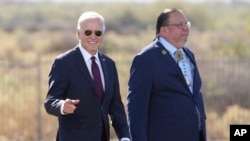
President Joe Biden visited the Gila River Indian Community in Arizona on Friday to deliver a long-awaited official apology to Native Americans for the federal boarding school system that severed the family, tribal and cultural ties of thousands of Indian children over multiple generations.
“I say this with all sincerity: This, to me, is one the most consequential things I've ever had an opportunity to do in my whole career as president of the United States,” Biden said.
He described how Native children were “stolen, taken away to places they didn't know by people they'd never met who spoke a language they had never heard,” he said.
“Children would arrive at school, their clothes taken off, their hair that they were told [was] sacred was chopped off, their names literally erased and replaced by a number or an English name,” he continued, “emotionally, physically and sexually abused, forced into hard labor, some put up for adoption without the consent of their birth parents, some left for dead in unmarked graves.”
When the time came to apologize, Biden shouted the words, “I formally apologize!”
Mixed reactions
In 2021, Interior Secretary Deb Haaland launched an investigation into federal and federally funded Indian boarding schools. The investigation confirmed that more than 18,600 Native American, Native Alaskan and Native Hawaiian children were forced to attend residential schools; 1,000 died during their enrollment.
The report recommended the U.S. government formally acknowledge and apologize for its role in the system and take steps to help survivors heal from its effects.
VOA spoke with Christine Diindiisi McCleave, a citizen of the Turtle Mountain Band of Chippewa Indians in North Dakota and former CEO of the National Native American Boarding School Healing Coalition (NABS), which collaborated with the Interior investigation.
“I think politically it is extremely significant that Biden traveled to tribal lands in Gila River to deliver the apology publicly, not bury it in a defense appropriations bill,” she said, referencing a 2009 defense spending bill that acknowledged “years of official depredations, ill-conceived policies and the breaking of covenants” and apologized for instances of “violence, maltreatment and neglect.”
“However, as a survivor, as somebody who worked for many years to make progress on this issue, yes, we need the acknowledgment, but we also need actions to follow that up,” she said.
Friday’s apology came late in Biden’s term. McCleave said she worried that a Republican win in the November 5 presidential vote could reverse the gains for tribes made during the Biden-Harris administration.
“I hope they pass the Truth and Healing Commission bill before the new term begins,” she said.
The bipartisan Truth and Healing Commission on Indian Boarding School Policies Act, currently making its way through Congress, would create a commission to investigate the boarding school system and recommend action to promote healing.
Schools only part of the story
On Friday, Biden summarized his investments in Indian Country, which include $32 billion from the American Rescue Plan, $13 billion to support improvements in tribal infrastructure and $700 million from the Inflation Reduction Act to combat the effects of climate change.
He did not, however, address growing calls from Native communities for the return of historic lands, a campaign dubbed “Land Back.”
Brenda J. Child, a citizen of the Red Lake Band of Chippewa in Minnesota, is a professor of American studies at the University of Minnesota who has written extensively about Indian boarding schools from the perspective of Indigenous Americans.
“Boarding schools were about dispossessing Indian people of their lands,” she said, “which went hand in hand with the complex policy called the General Allotment Act of 1887, which helped break up the traditional systems of land tenure.”
Also known as the Dawes Act, it divided Native Americans’ communal tribal lands into individual plots that were doled out to families and individuals. The leftover land – about 36 million hectares (90 million acres) – was opened up for sale to non-Native settlers, passing out of Indian control.
“So, what do we do now?” Child asked. “Apologies are nice, but if you don't change the behavior, we're still stuck. Now it's time to return some of that land that we lost.”
Watch Biden’s entire speech below:




